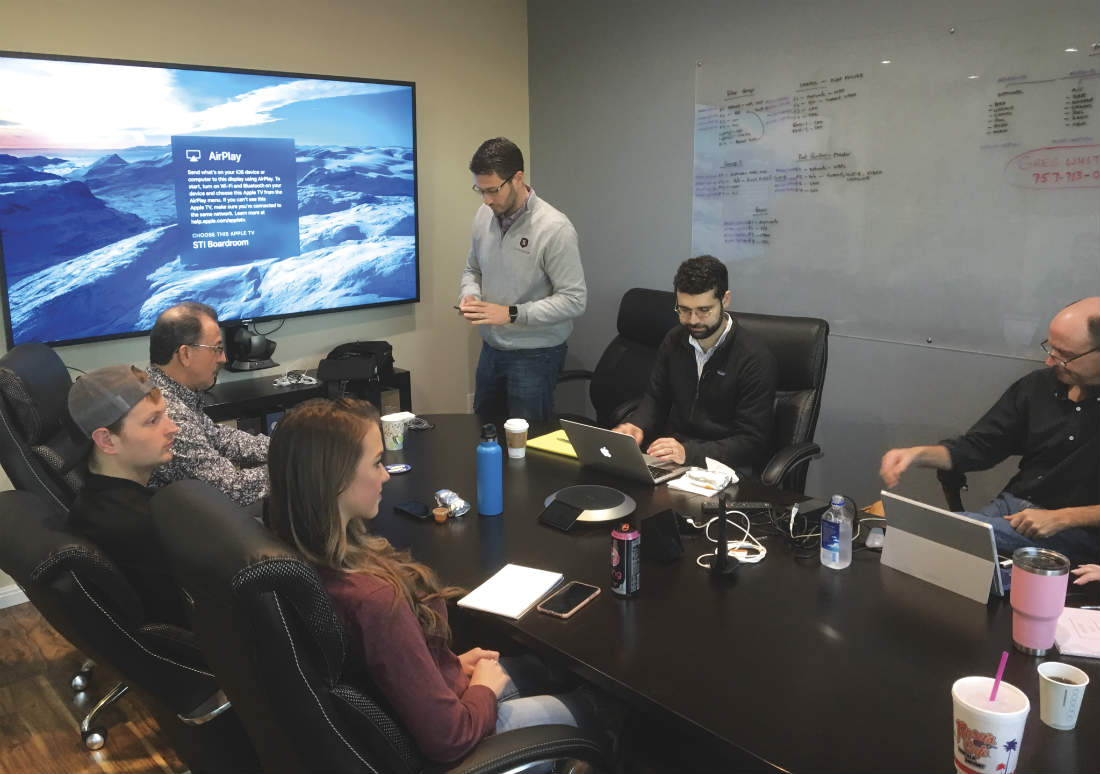A lot of integration companies “talk the talk” about that importance of service agreements and recurring monthly revenue (RMR), but Service Tech Audio Visual in Austin, Texas is “walking the walk.” The CE Pro 100 company has instituted a new policy whereby it will not do business with a new client unless they sign a service agreement. Period.
That new aggressive service agreement policy is one reason the 22-person company, led by president Chris Pearson, is coming off a successful 2018 in which the company earned $10.2 million in revenue.
Service Contracts Required
Pearson started in the A/V business back in the mid-1990s working for an integration company that focused on large commercial A/V and IT applications. So the focus of Service Tech AV when it was launched in 2003 was solely on commercial projects, with an emphasis on service agreements.
“The concept was that we were only going to do service contracts for commercial clients. That was the whole premise. That was the part of the business I liked — selling commercial service and earning recurring revenue. I would always get service contracts on my projects and always have them renew it or auto-renew.
“We would even lease the most expensive part of the project as a technology lease, like sign up for a 5,000-lumens projector for 36 months but after 18 months you can upgrade to a 10,000-lumens projector and renew the lease,” recalls Pearson, who eventually started doing residential projects in 2008.
It’s taken a while to transfer that same service-minded focus to the residential market, but starting this year Service Tech AV is drawing a line in the sand regarding service agreements.
“For 2019, I only want to deal with clients that want a long-term service relationship and they’ll pay for it. In the future, Service Tech AV, along with our partner OneVision Resources, is only going after clients that are willing to pay for service. I’m no longer an indentured servant,” says Pearson bluntly.
“The original thought of the creation of Service Tech AV was not to deliver products, it was to provide service. That’s why the company is called Service Tech.”
Read Next: How to Slice Your Taxable Income by 20%
After emphasizing how vital it is for a project to have a higher-end rebootable network, Pearson discusses the necessity of a service agreement with every customer. That communication about service graduates into a broader talk with clients about the quality of his full operation:
“Thank you for buying a $100,000 system from me, but that doesn’t mean it works 24/7 with no maintenance. You maintain your car, your body, your lawn … and your technology system needs to be maintained, too. I understand that it’s expensive, but if you want someone to pick up the phone 24/7, want people entering your house that have drug checks and background checks, want technicians in modern vehicles with access to tools, then you’ve got to pay for it. Those things cost money. You have to pay me for service.”
By having the service contract discussion at the beginning of the project, it also avoids that awkward conversation later.
“We are leading our sales conversations with service. At the end of the project, you can’t say to a client, ‘Hey, here’s the $10,000 service contract.’ You should have led with that discussion,” Pearson says.
“That should have been part of that seed you plant — that service costs money if you want it done right by professional people. If you’re not interested in any of that, I’ve got to let you go to my competition.”
Engaged With OneVision Resources

To achieve its service goal, Service Tech AV has engaged with OneVision Resources as its service partner. OneVision recently conducted its in-depth onboarding process with the entire Service Tech AV team.
That process includes creating the service plan, setting the pricing for the program, and outlining specific conversations to have with clients and any processes that needed to be changed, such as eliminating the old habit of having clients call a technician or salesperson directly.
Going forth, all those service calls from clients are directed to a central number at Service Tech AV, which is responded to by the OneVision staff 24/7 as a completely transparent extension of Service Tech.
Pearson says one other little-discussed benefit of having the OneVision 24/7 team onboard is that he discovered some clients hesitate to reach out for service because they think they are “bothering” him. Having a remotely rebootable system in place such as SnapAV OvrC eliminates that concern.
“I found the frustration of the client is, ‘I like you, Chris. You always respond, but I feel we’re handcuffed to you guys. Tell me, is there anything I can do so I don’t feel like I’m bothering you?’ That resonated with me. My God, we’ve been keeping these people captive. All they want to do is unplug the rack and plug it back in,” he comments.
Now, using SnapAV OvrC and OneVision as its instant triage remote service team, Service Tech AV clients can be walked through certain troubleshooting steps and systems can be rebooted remotely.
“I think SnapAV hit it out of the park with OvrC,” he says. “I like that OneVision reminds the client that service is not a free thing. It isn’t an expectation — it’s a process.”
The other benefit of Service Tech AV’s new service focus is that it is now freeing up the team to pursue other money-making ventures.
Also Read: Why Distributors Are Digging Deeper Into HDMI Education
“We’re trying to do service for a profit,” says Pearson flatly. “When I talk to other integrators and they tell me, ‘We handle it ourselves.’ I ask, ‘Why? What could you be doing if you weren’t busy handling service?’
“You could be getting a certification in lighting design, be building a demo for circadian rhythm lighting, or talking to a developer on health and wellness. You could be doing those things versus rolling a truck.”
For Service Tech AV, the OneVision partnership has freed up additional sales time — for everyone.
Pearson says now he has the time to go after the next large high-rise condo project in the area, while his dedicated service technicians can now focus on other revenue-generating tasks, such as seeking out past clients to look for outdated upgrades.
Defined Corporate Culture: Wearing Onesies!
Coincidental to Service Tech AV building out its RMR strategy, the company also takes great strides in creating a fun corporate culture. After all, how many custom installlation companies mandate their employees attend the company Christmas party wearing onesies, set up a photo booth, cater it with multiple food trucks, and pre-pay car services for everyone's ride home post-event? Not many.
Pearson has built a corporate culture that embraces diversity and celebrates fun while at the same time successfully competing in multiple markets, including commercial, high-rise condos and ultra-affluent single-family homes. The result is a company where people want to work— an important factor in today’s tight employment market.







